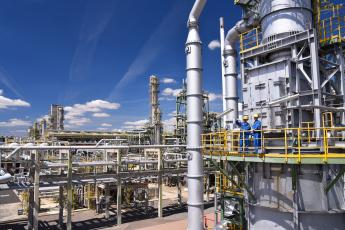As COVID-19 continues to proliferate across the country, the fuel and petrochemical workforce is facing new challenges, both at worksites and in their home communities. We took a moment to speak with Adam Ali, AFPM’s Manager of Workforce Development, about changes in the workplace employees are experiencing – including what happens when someone tests positive for COVID-19 — and actions being taken to protect and support the workforce.
How have things changed for employees at fuel and petrochemical facilities due to COVID? What are some new things they’re experiencing as companies work to protect the workforce during this emergency?
Adam Ali, AFPM Manager of Workforce Development: This is obviously an unprecedented event, but the workforce is really rising to the challenge. The 3.5 million employees that make up U.S. fuel and petrochemical manufacturing have been designated as essential operators of critical infrastructure by the U.S. government. As our members work with federal, state and local officials to mitigate any disruptions to the nation’s supply chain, they are simultaneously making a variety of adjustments to ensure the continued safety of employees.
Where possible, companies are having employees work from home. Still, much of the work in our industries happens onsite at our facilities. One of the most interesting shifts, in my opinion, is how some companies are using existing technology in the facilities to identify employees that may have early symptoms of COVID-19. For example, thermal imaging or infrared cameras are commonly used as monitoring tools in plants. In some cases, these devices are now being repurposed as screening devices to detect elevated body temperatures as people come in and out of the plant, with the goal of preventing the virus from coming onsite and safeguarding the workforce.
We hear a lot about the importance of social distancing. How does that work at a refinery or chemical plant?
AA: Companies are taking social distancing very seriously and limiting the exposure of their workforce to outside sources. For instance, some facilities are asking delivery truck drivers to stay in the cab if possible and to handle any necessary conversations by phone. And when employees can’t maintain social distancing due to the nature of some of the work — at ports, or for inspections that absolutely require two people, for example — companies are requiring employees to wear the proper PPE.
What happens at a facility if an employee tests positive for COVID-19?
AA: The first thing to consider is our members and specifically the sites are adhering to all of the state, local, and federal laws related to the response to an infected individual. Specifically, from a company perspective, they’re first asking the impacted employee to quarantine and seek medical attention. The idea here is to make sure that the employee and all of the folks that they’ve been in contact with are safe and on the path of recovery as soon as possible.
Next, companies seek to identify who has been exposed and possibly quarantine some of those people. Almost immediately after the person is removed from the facility, the workspace is sterilized to prevent further exposure.
And then, per the state, local, and federal laws, they’re following the standards on getting that employee to return to work. Whether it’s through the employee’s chosen medical professional or an onsite medical professional, they’re following the relevant procedures to ensure that the person is able to be back, healthy and contributing at the company.
How are employees reacting to all the changes on site?
AA: Everyone is really doing their part. In my view, the entire workforce are heroes, especially the folks who are driving in and out of work to keep facilities going. While it’s certainly a challenging atmosphere, I would say that employees are definitely proud to be able to supply what’s required — whether it’s fuel or petrochemicals — in this emergency situation. The culture within these sites has always been about safety being a shared responsibility, so employees have always been partners in maintaining a safe facility and this situation is an extension of that.
I would also say that many employees have expressed feeling empowered during this process. Employers in general are looking at current policies to put their employees first and offering flexibility where applicable, and my sense is that employees are feeling like the companies are trying their best to take care of them in these difficult times and are grateful for that.
Between physical distancing and so many people working offsite, how is critical information being distributed to and between employees?
AA: With the evolving nature of the pandemic, keeping employees apprised of developments is absolutely a top priority. Most AFPM member companies have stood up landing pages on their company intranet sites to provide pertinent information and updates, and these are the major hubs through which employees access company information. In many cases companies have designed these webpages to comprise both corporate- and site-level information and updates, along with helpful governmental resources, so that employees can access it all readily and easily.
In a similar fashion, AFPM has created a COVID webpage to host resources and content for the fuel and petrochemical industries as well as links to relevant government agencies and resources.
The employees keeping these plants running generally live in the communities surrounding the facilities where they work. How are petrochemical and refining companies supporting their broader communities right now?
AA: Our members always aim to support the communities in which they operate and live. As a workforce and as an employee base, the folks in this industry really care about their community. Many of our members have stepped up in this time of need. Some have started to repurpose some of their manufacturing processes to produce and donate products that they do not normally manufacturer, like hand sanitizer, which is part of the first line of defense against transmission of the virus but is in short supply.
Some other ways that our members are stepping up are by ramping up production of N95 masks and donating fuel cards to organizations that provide important COVID-19-related services to the community. Our members have even continued in-kind donations to support low-income students’ remote learning needs by donating kindle tablets and books. And of course, many of our members have donated generously to support local charities providing food, health services, and more general support to their communities.
Any closing thoughts?
AA: The workforces in our industries are incredibly resilient. They are very close-knit and work extremely well as a team, both industry-wide, among different companies, and within each company. It’s really encouraging to see everyone come together to collaborate on solutions to tackle this global issue.


